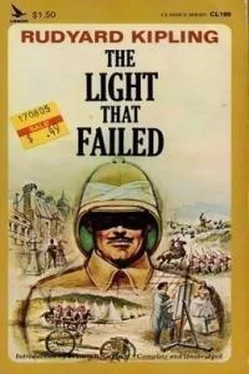Dick crammed head and shoulders out of the window and looked across the river. Torpenhow came to his side, while the Nilghai passed over quietly to the piano and opened it. Binkie, making himself as large as possible, spread out upon the sofa with the air of one who is not to be lightly disturbed.
'Well,' said the Nilghai to the two pairs of shoulders, 'have you never seen this place before?'
A steam–tug on the river hooted as she towed her barges to wharf. Then the boom of the traffic came into the room. Torpenhow nudged Dick.
'Good place to bank in—bad place to bunk in, Dickie, isn't it?'
Dick's chin was in his hand as he answered, in the words of a general not without fame, still looking out on the darkness—'"My God, what a city to loot!"'
Binkie found the night air tickling his whiskers and sneezed plaintively.
'We shall give the Binkie–dog a cold,' said Torpenhow. 'Come in,' and they withdrew their heads. 'You'll be buried in Kensal Green, Dick, one of these days, if it isn't closed by the time you want to go there—buried within two feet of some one else, his wife and his family.'
'Allah forbid! I shall get away before that time comes. Give a man room to stretch his legs, Mr. Binkie.' Dick flung himself down on the sofa and tweaked Binkie's velvet ears, yawning heavily the while.
'You'll find that wardrobe–case very much out of tune,' Torpenhow said to the Nilghai. 'It's never touched except by you.'
'A piece of gross extravagance,' Dick grunted. 'The Nilghai only comes when I'm out.'
'That's because you're always out. Howl, Nilghai, and let him hear.'
'The life of the Nilghai is fraud and slaughter, His writings are watered Dickens and water; But the voice of the Nilghai raised on high Makes even the Mahdieh glad to die!'
Dick quoted from Torpenhow's letterpress in the Nungapunga Book.
'How do they call moose in Canada, Nilghai?'
The man laughed. Singing was his one polite accomplishment, as many Press–tents in far–off lands had known.
'What shall I sing?' said he, turning in the chair.
'"Moll Roe in the Morning,"' said Torpenhow, at a venture.
'No,' said Dick, sharply, and the Nilghai opened his eyes. The old chanty whereof he, among a very few, possessed all the words was not a pretty one, but Dick had heard it many times before without wincing. Without prelude he launched into that stately tune that calls together and troubles the hearts of the gipsies of the sea—
'Farewell and adieu to you, Spanish ladies, Farewell and adieu to you, ladies of Spain.'
Dick turned uneasily on the sofa, for he could hear the bows of the Barralong crashing into the green seas on her way to the Southern Cross.
Then came the chorus—
'We'll rant and we'll roar like true British sailors, We'll rant and we'll roar across the salt seas, Until we take soundings in the Channel of Old England From Ushant to Scilly 'tis forty–five leagues.'
'Thirty–five–thirty–five,' said Dick, petulantly. 'Don't tamper with Holy Writ. Go on, Nilghai.'
'The first land we made it was called the Deadman,' and they sang to the end very vigourously.
'That would be a better song if her head were turned the other way—to the Ushant light, for instance,' said the Nilghai.
'Flinging his arms about like a mad windmill,' said Torpenhow. 'Give us something else, Nilghai. You're in fine fog–horn form tonight.'
'Give us the "Ganges Pilot"; you sang that in the square the night before El–Maghrib. By the way, I wonder how many of the chorus are alive to–night,' said Dick.
Torpenhow considered for a minute. 'By Jove! I believe only you and I.
Raynor, Vicery, and Deenes—all dead; Vincent caught smallpox in Cairo, carried it here and died of it. Yes, only you and I and the Nilghai.'
'Umph! And yet the men here who've done their work in a well–warmed studio all their lives, with a policeman at each corner, say that I charge too much for my pictures.'
'They are buying your work, not your insurance policies, dear child,' said the Nilghai.
'I gambled with one to get at the other. Don't preach. Go on with the "Pilot." Where in the world did you get that song?'
'On a tombstone,' said the Nilghai. 'On a tombstone in a distant land. I made it an accompaniment with heaps of base chords.'
'Oh, Vanity! Begin.' And the Nilghai began—
'I have slipped my cable, messmates, I'm drifting down with the tide, I have my sailing orders, while yet an anchor ride.
And never on fair June morning have I put out to sea With clearer conscience or better hope, or a heart more light and free.
'Shoulder to shoulder, Joe, my boy, into the crowd like a wedge Strike with the hangers, messmates, but do not cut with the edge.
Cries Charnock, "Scatter the faggots, double that Brahmin in two, The tall pale widow for me, Joe, the little brown girl for you!"
'Young Joe (you're nearing sixty), why is your hide so dark? Katie has soft fair blue eyes, who blackened yours?—Why, hark!'
They were all singing now, Dick with the roar of the wind of the open sea about his ears as the deep bass voice let itself go.
'The morning gun— Ho, steady! the arquebuses to me! I ha' sounded the Dutch High Admiral's heart As my lead doth sound the sea. 'Sounding, sounding the Ganges, floating down with the tide, Moore me close to Charnock, next to my nut–brown bride.
My blessing to Kate at Fairlight—Holwell, my thanks to you; Steady! We steer for heaven, through sand–drifts cold and blue.'
'Now what is there in that nonsense to make a man restless?' said Dick, hauling Binkie from his feet to his chest.
'It depends on the man,' said Torpenhow.
'The man who has been down to look at the sea,' said the Nilghai.
'I didn't know she was going to upset me in this fashion.'
'That's what men say when they go to say good–bye to a woman. It's more easy though to get rid of three women than a piece of one's life and surroundings.'
'But a woman can be―' began Dick, unguardedly.
'A piece of one's life,' continued Torpenhow. 'No, she can't. His face darkened for a moment. 'She says she wants to sympathise with you and help you in your work, and everything else that clearly a man must do for himself. Then she sends round five notes a day to ask why the dickens you haven't been wasting your time with her.'
'Don't generalise,' said the Nilghai. 'By the time you arrive at five notes a day you must have gone through a good deal and behaved accordingly.
Shouldn't begin these things, my son.'
'I shouldn't have gone down to the sea,' said Dick, just a little anxious to change the conversation. 'And you shouldn't have sung.'
'The sea isn't sending you five notes a day,' said the Nilghai.
'No, but I'm fatally compromised. She's an enduring old hag, and I'm sorry I ever met her. Why wasn't I born and bred and dead in a three–pair back?'
'Hear him blaspheming his first love! Why in the world shouldn't you listen to her?' said Torpenhow.
Before Dick could reply the Nilghai lifted up his voice with a shout that shook the windows, in 'The Men of the Sea,' that begins, as all know, 'The sea is a wicked old woman,' and after reading through eight lines whose imagery is truthful, ends in a refrain, slow as the clacking of a capstan when the boat comes unwillingly up to the bars where the men sweat and tramp in the shingle.
'"Ye that bore us, O restore us! She is kinder than ye; For the call is on our heart–strings!" Said The Men of the Sea.' The Nilghai sang that verse twice, with simple cunning, intending that Dick should hear. But Dick was waiting for the farewell of the men to their wives.
'"Ye that love us, can ye move us? She is dearer than ye; And your sleep will be the sweeter," Said The Men of the Sea.' The rough words beat like the blows of the waves on the bows of the rickety boat from Lima in the days when Dick was mixing paints, making love, drawing devils and angels in the half dark, and wondering whether the next minute would put the Italian captain's knife between his shoulder–blades. And the go–fever which is more real than many doctors' diseases, waked and raged, urging him who loved Maisie beyond anything in the world, to go away and taste the old hot, unregenerate life again,—to scuffle, swear, gamble, and love light loves with his fellows; to take ship and know the sea once more, and by her beget pictures; to talk to Binat among the sands of Port Said while Yellow 'Tina mixed the drinks; to hear the crackle of musketry, and see the smoke roll outward, thin and thicken again till the shining black faces came through, and in that hell every man was strictly responsible for his own head, and his own alone, and struck with an unfettered arm. It was impossible, utterly impossible, but—
Читать дальше












